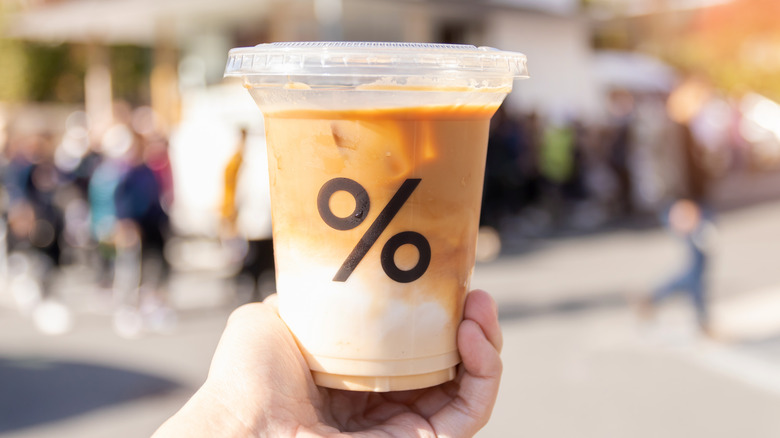How Starbucks Inspired Coffee Chain %ARABICA
Coffee first appeared in Japan during the mid-19th century by way of Dutch traders, who brought coffee to a culture that predominantly drank tea, per Japanese Coffee. And even though the idea of drinking coffee didn't really appeal to the Japanese at the time, a man named Tei Eikei, who fell in love with European coffee culture during his time spent in France, decided it was worth opening a western-style coffee shop in his home country anyway, which he did in 1888, per Bean poet. Even though that shop closed after five years, Tofugu said the shop — known as "Kahiichakan" was around for long enough to establish a trend for "kissaten" — Japanese establishments that served straight coffee or tea in a decidedly modern, western setting.
A fresh attempt to make coffee mainstream came in 1933 by way of Tadao Ueshima, who is credited with laying the groundwork for Japan's coffee industry, and who is known as the "Father of Coffee in Japan. The Second World War and a subsequent coffee import ban meant that the beverage couldn't be enjoyed for several decades– and it was not until the bans were lifted that Ueshima revived the concept of canned coffee in the 1960s, brought renewed interest in the beverage, per Japanese Coffee.
%Arabica's owner credits Starbucks for his interest in coffee culture
Before Starbucks arrived on the scene in Japan in 1996, Voyapon says most of the coffee shops in Japan were like the kissaten of the old days — simple stores serving basic black coffee. But that changed, Voyapon says, with the arrival of what it called "second wave" coffee shops in the form of imports like Starbucks and Dunkin' Donuts.
It took %Arabica founder Kenneth Shoji to leave his native Japan for the United States to discover how Starbucks would fit into his life. In a letter explaining the coffee chain's philosophy to %Arabica's fans, Shoji says his time as a college student in the United States saw him spending plenty of time at a Starbucks in Southern California's Venice Beach, enthralled with what the chain offered: the idea of coffee culture and what Shoji described as its "serene atmosphere" and that, we can imagine, is what Shoji was looking to serve up when he opened his %Arabica flagship store in Kyoto.
Starbucks inspired %Arabica's founder in an unexpected way
Shoji's transition from coffee lover to coffee shop owner is a story in and of itself. He tells Frame he was living in Hong Kong and struggling to find good coffee when he decided to produce the beans himself. So he invested in a Hawaiian coffee farm before opening his first %Arabica in a Hong Kong suburb named Discovery Bay.
And while Shoji might have first discovered coffee culture thanks to Starbucks, he also took inspiration from Starbucks to create %Arabica — but not in the way that we might think. He tells Frame that while he was a big Starbucks fan in his 20s and that while it was an amazing brand, "now they [Starbucks] are a huge global company and it's not exciting to walk into their stores because they all look identical." Instead, Shoji decided to take inspiration from non-foodie brands like Aēsop, whose retail spaces are inspired by both local designers and local concepts.


